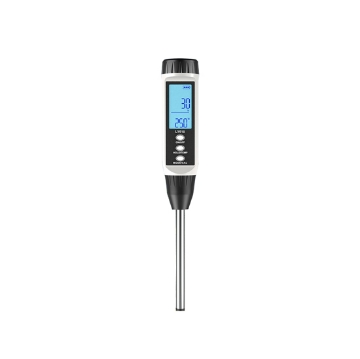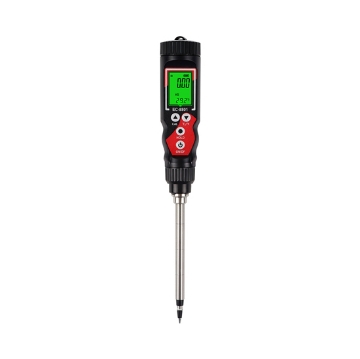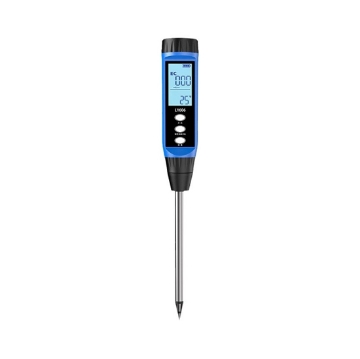Soil Conductivity Meters
Digital Conductivity Meter for Soil Testing
Digital EC Tester for Soil
Digital Soil EC Meter with Direct Insertion Probe
Digital Waterproof Soil Conductivity Meter
Soil Conductivity Meters—also known as Soil EC Meters—are essential instruments for evaluating the electrical conductivity (EC) of soil, a key indicator of soluble salt concentration and nutrient availability. By providing accurate, real-time data on soil salinity, these devices help farmers, agronomists, and environmental professionals make better decisions on fertilization, irrigation, and soil health management.
What is Soil EC and Why Should You Measure It?
Soil Electrical Conductivity (EC) is a measurement of the soil’s ability to conduct an electrical current, which is directly related to the concentration of soluble salts, ions, and nutrients present in the soil. These salts include essential elements like nitrogen (nitrate), potassium, calcium, and magnesium—key factors that influence plant growth, soil fertility, and water retention.
Monitoring soil EC is important because it helps you understand the chemical balance in the soil. If the EC is too low, it could indicate a lack of nutrients, making it difficult for crops to thrive. On the other hand, excessively high EC levels might signal salt buildup, often caused by over-fertilization or poor drainage, which can lead to root damage, nutrient lockout, and reduced yields.
Regularly measuring soil EC provides valuable insights for:
- Optimizing fertilizer application, ensuring plants receive what they need without waste
- Improving irrigation strategies, by identifying zones of salt accumulation or poor drainage
- Detecting early signs of soil degradation, salinization, or contamination
- Guiding precision agriculture, where real-time data helps you manage soil variability across fields
Applications of Soil EC Meters
Soil EC meters are versatile instruments used across multiple industries and disciplines where soil quality, salinity, and nutrient management are critical. From commercial agriculture to environmental monitoring, these tools support smarter decisions through accurate data. Below are some of the most common applications:
Agriculture & Farming
In precision agriculture, understanding soil EC helps farmers apply the right amount of fertilizer and water exactly where it’s needed. By mapping soil conductivity across fields, they can identify variability zones, reduce waste, and improve crop yields while conserving resources.
Greenhouse & Horticulture
In controlled growing environments like greenhouses, soil EC meters help monitor root zone conditions to prevent over-fertilization or nutrient imbalances. This ensures optimal growth for vegetables, flowers, and specialty crops.
Environmental Monitoring
Soil EC meters are widely used in land restoration projects, forestry, and contaminated site assessments. Monitoring EC helps detect salt-affected areas, track pollution levels, and evaluate changes in soil chemistry over time.
Soil & Crop Research
Universities, agricultural labs, and research institutions rely on soil EC data to study plant-soil interactions, fertilizer behavior, and environmental impact. Reliable, repeatable EC readings are essential for scientific analysis.
Education & Training
Soil EC meters are also used in educational programs to teach students about soil chemistry, salinity, and sustainable farming. They’re practical tools for both classroom instruction and field training.
Why Choose SISCO Soil Conductivity Meters?
The SISCO soil conductivity meter is specifically designed for direct insertion into soil and integrates EC measurement with moisture and temperature sensors, offering a comprehensive solution for real-time soil analysis. This makes it ideal for a wide range of applications, including precision agriculture, greenhouse cultivation, soil science research, and environmental monitoring.
Our range of digital soil EC meters includes models with intuitive digital displays, backlit screens for low-light conditions, IP-rated waterproof construction, and compact, portable designs. Whether you're conducting routine field testing or in-depth scientific studies, these meters provide the reliability and versatility you need for professional-grade soil diagnostics.
Investing in a high-quality soil EC meter empowers you to monitor critical soil conditions, reduce resource waste, and improve crop yields, making it an indispensable tool for modern, sustainable land management.





